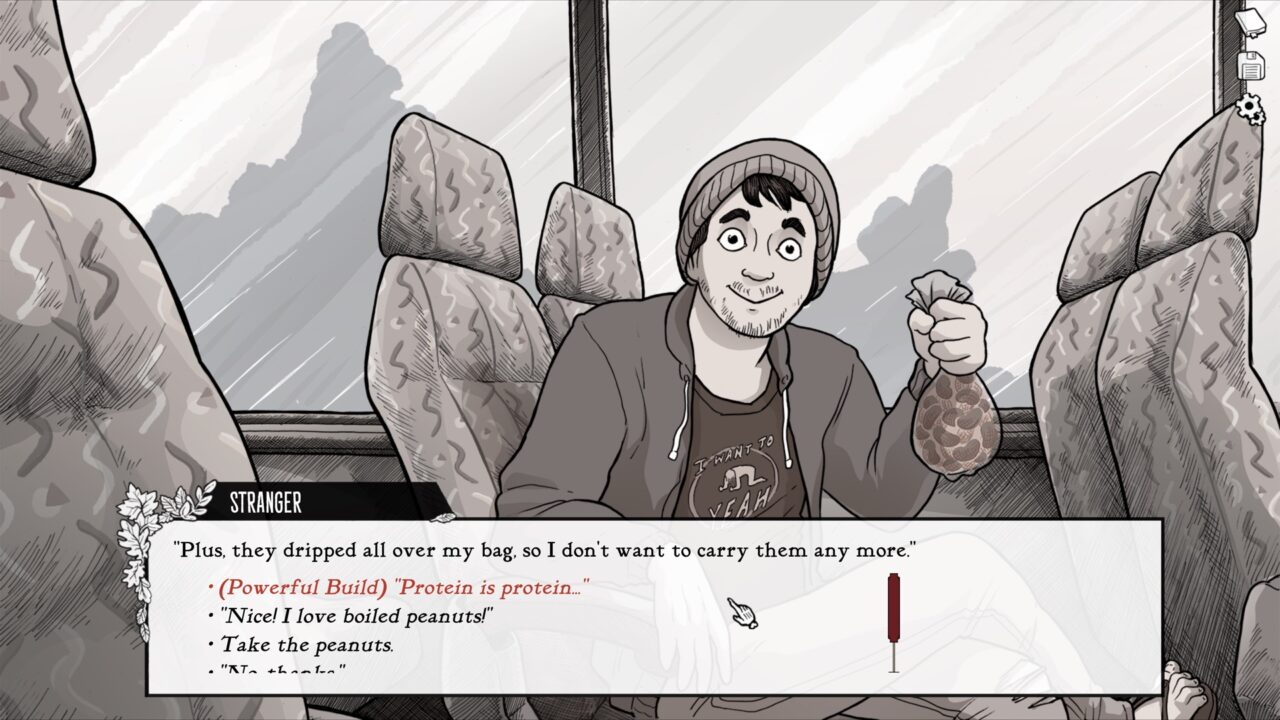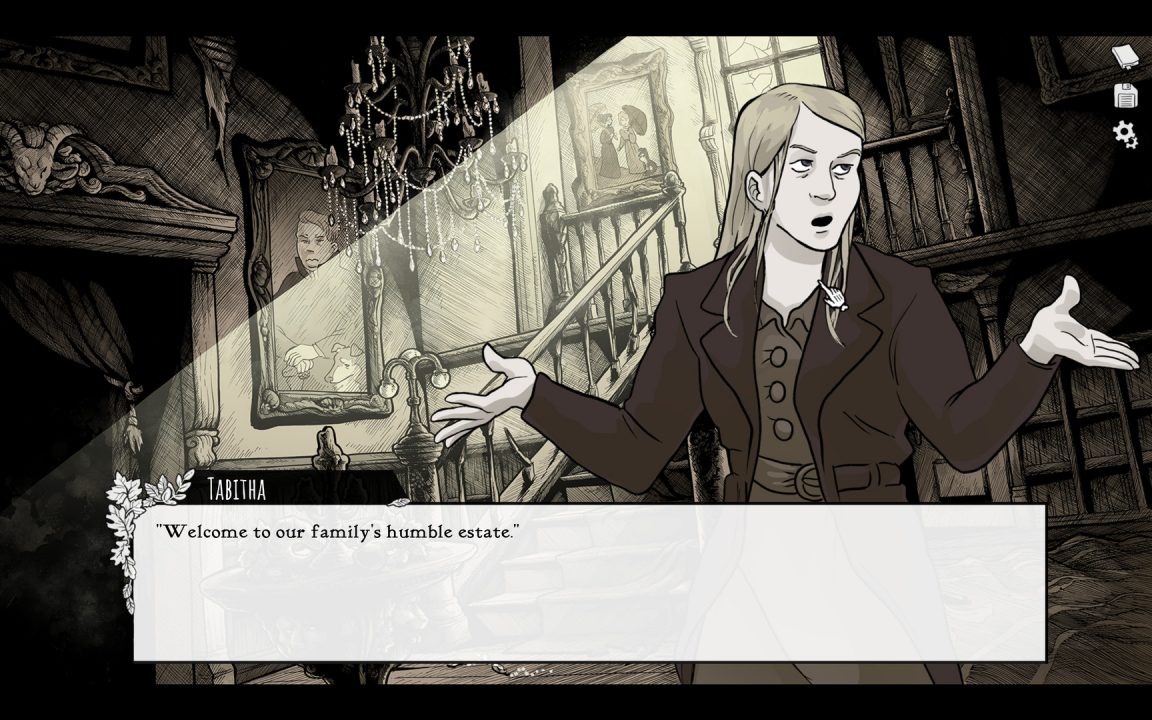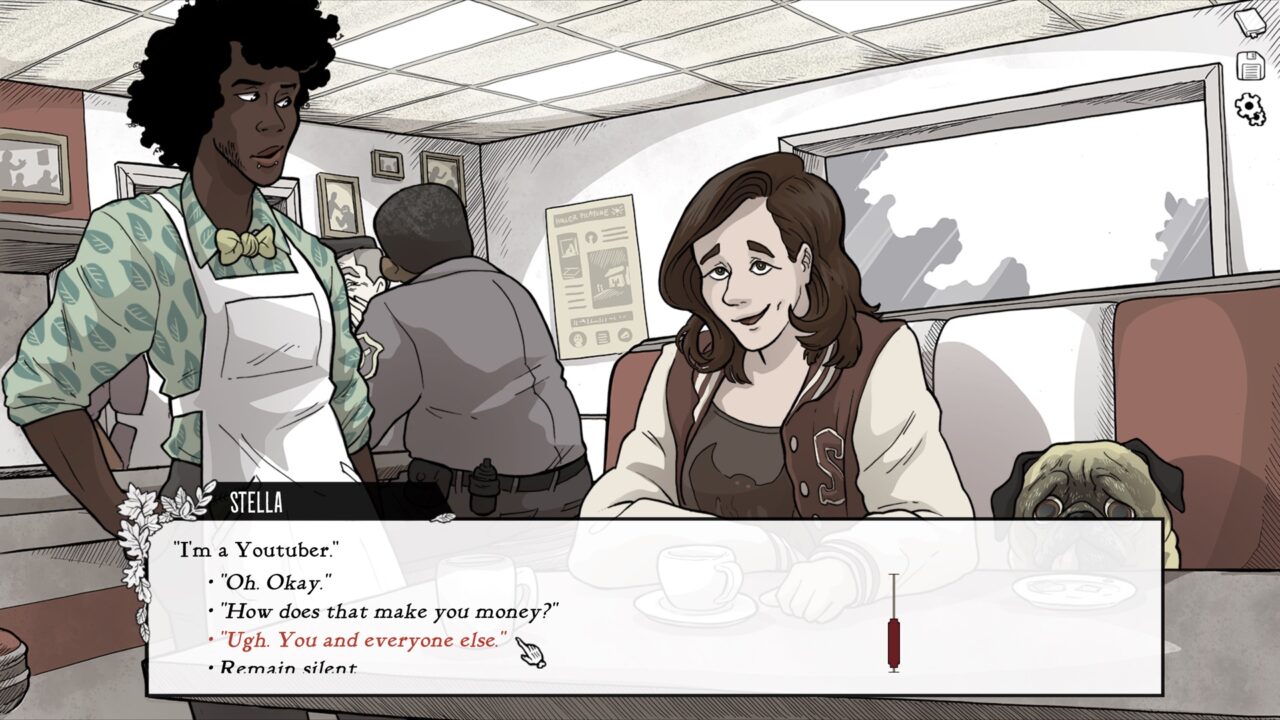When talking about Western visual novels, the first example most would point to is Doki Doki Literature Club, which took the gaming community by storm in 2017. With DDLC‘s meta-commentary and fourth wall breaks that pushed the boundaries of self-awareness in visual novels and games in general, I hoped that perhaps the time had come for the West to begin churning out quality titles to match Japan’s extensive catalog. But the years since DDLC‘s release have been disappointingly barren, with few if any noteworthy titles managing to make so much as a splash. Even worse, Telltale Games’ decline and eventual demise seemed to all but seal the fate of Western visual novels/graphic adventures as nothing more than brief fads, condemned to forever languish in indie obscurity.
But Black Tabby Games’ debut effort in the first episode of Scarlet Hollow has me excited like I was three years ago when the hype surrounding DDLC was still in its prime. Despite only having one chapter out on Steam, Scarlet Hollow not only manages to check off all the boxes in the list of what constitutes a good visual novel (or a good book for that matter), but also delivers a compelling Western take on a genre otherwise defined by Japanese tropes.
After learning of your estranged aunt’s passing, you make your way to her hometown of Scarlet Hollow to attend her funeral, but the ceremony is still a week away when you arrive. In the meantime, you find yourself having to deal with your all-too-prickly cousin Tabitha and the various levels of gossip and thinly veiled hostility from the locals as the darker secrets of the town begin to intertwine with your journey to discover the truth of Scarlet Hollow.
Admittedly, the journey so far is barely a two-hour read since only the first episode, out of a planned seven, is available on Steam right now. But boy, what a first episode it is.

Upon starting up the game, you’re immediately greeted by an unfamiliar sight in visual novels: a rudimentary character creation screen. The few times that character creators have been included in visual novels they usually end up detracting from the overall experience more than anything. After all, in a genre as intensely story-driven as visual novels, every bit of narrative substance counts. Exchanging a protagonist specifically written and designed for the story for a seemingly minuscule amount of customization is surely a mistake, I thought.
But the character creator in Scarlet Hollow manages to overcome these doubts beautifully with the trait selector, which gives you the option of choosing two out of seven character traits before starting the story proper. At first glance, the traits seem fairly standard if not arbitrary; perhaps you’d fancy being “street smart” and “book smart” to weave through conversations, or maybe you’d rather be “mystical” and have a “keen eye” in order to get a better sense of the supernatural that so readily lurks in the story. But these traits end up being one of the defining features of any given playthrough and add immense replay value as you mix and match in order to see the various secrets and hidden interactions peppered throughout every combination.
The amount of replay value this system adds cannot be stated enough, especially once you begin experimenting with the more esoteric traits like “talk to animals” or the aforementioned “mystical.” Without giving too much away, what should have been a basic two-hour read-through all of a sudden became a six-hour binge-reading session, with every new revelation from each trait making me grin at the ingenuity, and at times the cheek, of the system’s implementation.

But even beyond the quirky traits, the writing overall is simply delightful. It’s contemporary but not overly indulgent, and it’s nuanced when it matters but simple enough to understand without analysis. Abby Howard manages to strike a remarkable balance in both style and substance, making Scarlet Hollow a gripping read from the get-go that eschews the age-old genre trope of having a meandering multi-hour prologue for the sake of setup — an issue that even the most critically acclaimed visual novels have trouble shaking.
I particularly enjoyed the “explore” aspect that appears in almost every dialogue-selection scene. This is essentially just a fluff option that, as the name suggests, allows you to poke around in some backstory or lore when conversing with characters without directly advancing the main story itself. What makes this feature stand out, however, is the sheer range of choices presented. The typical middle-of-the-road, slightly mean, or slightly nice options are available for players seeking to emulate more standard conversations, but the inclusion of choices that verge on D&D-style chaotic evil is downright hilarious. While I don’t recommend picking these responses most of the time if you wish to make meaningful progress with the characters you encounter, they’re nonetheless enjoyable romps that are well worth the several reloads it takes to read through all of them.

Aesthetics in Scarlet Hollow are also superb, especially the visuals. The meticulous care and effort put into the art can be felt in every scene, from simple things like snacks in a backpack to your aunt’s sprawling mansion. Admittedly, some of the designs are a tad unimaginative, but the artwork overall is presented with such polish that you barely notice them while reading.
Sound, on the other hand, is somewhat bland, as nothing really stands out. The music is serviceable but unremarkable as far as mystery/horror soundtracks go, and the lack of voice acting, while understandable, is worth pointing out. But whatever the sound might lack in substance, it more than makes up for with its implementation in the gameplay itself and interactions with some of the character traits.
Overall, Scarlet Hollow is nothing short of a fantastic start to what will hopefully be a defining Western horror visual novel experience. In a short time frame of two hours, Abby Howard not only proves her merits in the qualities most important to visual novels but also manages to add her own flavors and spins to the genre with remarkable confidence. Needless to say, I’m more than eager to see what she has in store for Episode 2 and the subsequent story left to be told.


